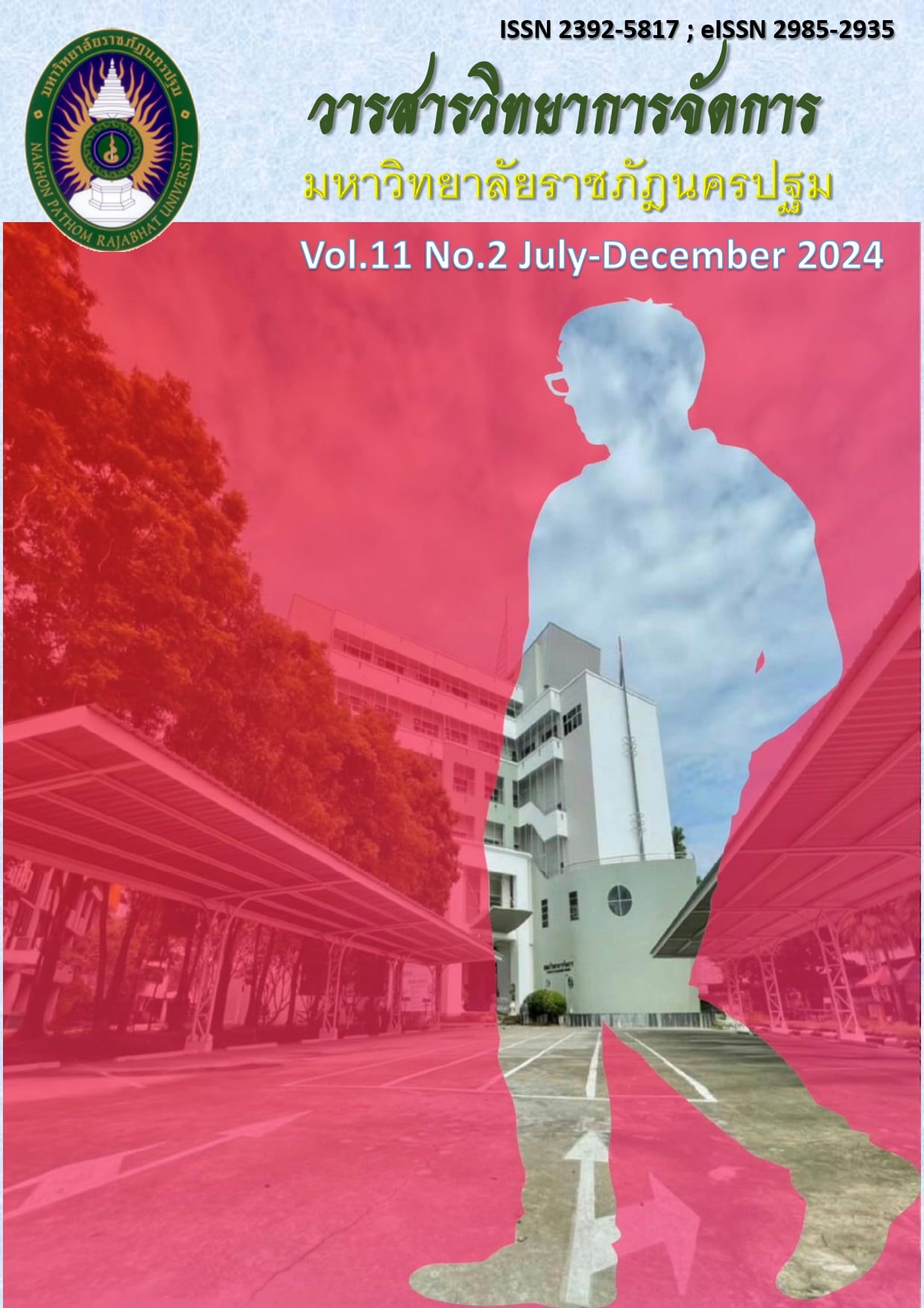Exploring AI Applications in Esports Management: Opportunities for Thailand
Main Article Content
Abstract
The esports industry has experienced exponential growth, evolving into a global phenomenon with substantial economic and cultural significance. In Thailand, the esports ecosystem has expanded rapidly, driven by government support, strategic investments, and partnerships with major corporations. These factors have positioned the country as a prominent player in Southeast Asia's esports landscape, demonstrating its capacity for innovation and competitive development.
Artificial intelligence (AI) is revolutionizing esports management by optimizing player performance, streamlining tournament operations, and enhancing audience engagement. In Thailand, AI adoption is gradually transforming how organizations analyze gameplay, develop strategies, and provide immersive experiences for fans. Nevertheless, the industry faces significant challenges, including data privacy concerns, digital infrastructure disparities, and skill gaps, which must be addressed to ensure the ethical and equitable integration of AI technologies.
This article examines the applications, challenges, and opportunities of AI in esports management, emphasizing Thailand's unique context. It highlights the importance of leveraging government initiatives, expanding educational programs, and developing esports innovation hubs to foster sustainable growth. While global leadership in AI-driven esports remains an ambitious goal, these efforts can significantly strengthen Thailand’s position in the regional and global esports ecosystem.
Article history: Received 25 June 2024
Revised 25 November 2024
Accepted 27 November 2024
SIMILARITY INDEX = 0.00
Article Details

This work is licensed under a Creative Commons Attribution-NonCommercial-NoDerivatives 4.0 International License.
The views and opinions of the article appearing in this journal are those of the author. It is not considered a view and responsibility of the editorial staff.
References
Acree, J. (2024). Shaping the future of Esports with AI. USC Annenberg School for Communication and Journalism. Retrieved April 29, 2024, from https://annenberg.usc.edu/research/center-public-relations/usc-annenberg-relevance-report/shaping-future-esports-ai
Apriliyanti, I. D., Ekowati, D., and Saraswati, R. (2021). Digital divide in ASEAN member states: Analyzing the critical factors for successful e-government programs. Online Information Review, 45(6), 1104–1125. https://doi.org/10.1108/OIR-05-2020-0158
Davenport, T. H., and Ronanki, R. (2018). Artificial intelligence for the real world. Harvard Business Review, 96(1), 108–116.
Digital Economy Promotion Agency (DEPA). (2023). eSports: เกมที่เป็นมากกว่าเกม [eSports: More than just a game]. Retrieved April 29, 2024 from https://www.depa.or.th/th/article-view/esports [in thai]
Durwin, A. S. (2023). Impact of artificial intelligence (AI) in gaming technology. Journal of Harbin Engineering University, 44(7), 1352–1355.
Esports Insider. (2023). AI in esports. Retrieved November 23, 2023, from https://esportsinsider.com/2023/11/ai-esports
Forbes. (2023). AI-powered audience growth: How esports uses artificial intelligence to connect with fans. Retrieved September 26 from https://www.forbes.com/councils/forbestechcouncil/2023/09/26/ai-powered-audience-growth-how-esports-uses-artificial-intelligence-to-connect-with-fans/
Ghatak, S. (2023). Lessons we learn: AI in eSports—How artificial intelligence is shaping the world of competitive gaming. Retrieved April 6, 2024, from https://www.linkedin.com/pulse/lessons-we-learn-ai-esports-how-artificial-shaping-world-ghatak
Intaratat, K. (2021). Digital skills scenario of the workforce to promote digital economy in Thailand under and post COVID-19 pandemic. International Journal of Research and Innovation in Social Science, 5(10), 116–127. https://doi.org/10.47772/IJRISS.2021.51002
Jordan-Vallverdú, V., Torres-Pruñonosa, J., Plaza-Navas, M.-A., and Raya, J. M. (2024). The intellectual structure of esports research. Entertainment Computing, 49, 100628. https://doi.org/10.1016/j.entcom.2023.100628
Keiper, M. C., Fried, G., Lupinek, J., and Nordstrom, H. (2023). Artificial intelligence in sport management education: Playing the AI game with ChatGPT. Journal of Hospitality, Leisure, Sport and Tourism Education, 33, 100456. https://doi.org/10.1016/j.jhlste.2023.100456
Kittitachs. (2023). Sportlyze: บริษัทวิเคราะห์อีสปอร์ตที่จะพา AI คนไทยไปตลาดโลก. Retrieved , October 6, 2023 from https://www.oneesports.co.th/gaming/sportlyze-บริษัท-วิเคราะห์/[in thai]
Lopez-Sintas, J., Lamberti, G., and Sukphan, J. (2020). The social structuring of the digital gap in a developing country: The impact of computer and internet access opportunities on internet use in Thailand. Technology in Society, 63, 101433.
Mana, K., and Butr-Indr, B. (2022). Appropriate measures of personal data protection in processing by artificial intelligence under Thai law: Study specific on machine learning. [Master’s thesis, Thammasat University]. Thammasat University E-Thesis Archive. https://ethesisarchive.library.tu.ac.th/thesis/2022/TU_2022_5901040187_17613_26816.pdf
Manoharan, A. (2024). Enhancing audience engagement through AI-powered social media automation. World Journal of Advanced Engineering Technology and Sciences, 11(2), 150–157. https://doi.org/10.30574/wjaets.2024.11.2.0084
PDPA Thailand. (2022,). ธุรกิจเกม ต้องระวัง! ละเมิดสิทธิผู้เยาว์ ตามกฎหมาย PDPA [Gaming business must beware! Violating minors’ rights under the PDPA]. Retrieved August 30, 2023, from https://pdpathailand.com/article/article-game-caster-pdpa/[in thai]
Prasad, R. K., and Makesh, D. (2023). Impact of AI on media and entertainment industry. In Media and Journalism Transformations: Emerging Trends and Paradigm Shifts (pp. 41–52).
Ringer, C., Missaoui, S., Hodge, V. J., Chitayat, A. P., Kokkinakis, A., Patra, S., Demediuk, S., Caceres Munoz, A., Olarewaju, O., Ursu, M., Kirman, B., Hook, J., Block, F., Drachen, A., and Walker, J. A. (2023). Time to Die 2: Improved in-game death prediction in Dota 2. Machine Learning with Applications, 12, 100466. https://doi.org/10.1016/j.mlwa.2023.100466
Royal Thai Government Gazette. (2024). ประกาศคณะกรรมการกีฬาอาชีพ เรื่อง กำหนดชนิดกีฬาอาชีพ พ.ศ. 2566 [Announcement of the Professional Sports Committee regarding the designation of professional sports, B.E. 2566]. Retrieved April 6, 2024, from https://ratchakitcha.soc.go.th/documents/18007.pdf [in thai]
Smerdov, A., Belokurov, A., Ivanov, E., and Knyazev, A. (2022). AI-enabled prediction of video game player performance using data from heterogeneous sensors. Multimedia Tools and Applications, 81(10), 13567–13587. https://doi.org/10.1007/s11042-022-13464-0
Soodmee, T., and Jaroenwiriyakul, S. (2021). The future of e-sports: Factors affecting performance in Thailand. In Proceedings of the 14th National and 1st International Conference on Business, Economics, and Sustainable Development. NIC-HUSO 2021). Burapha University, on June 17-18, 2021. pp.1411-1427.
Statista. (2024). Esports - Thailand: Statista market forecast. Retrieved March 3, 2024, from https://www.statista.com/outlook/amo/esports/thailand
Taylor Wessing. (2023). A practical guide on AI ethics and accountability in video games. Retrieved March 3, 2024, from https://www.taylorwessing.com/en/interface/2023/ai-and-video-games/a-practical-guide-on-ai-ethics-and-accountability-in-video-games
Vandeweyer, M., Espinoza, R., Reznikova, L., Lee, M., and OECD. (2020). Thailand's education system and skills imbalances: Assessment and policy recommendations. OECD iLibrary. https://doi.org/10.1787/b79addb6-en
Wang, M. (2023). The communication effectiveness of AI win prediction applied in esports live streaming: A pilot study. In Advances in AI Technologies (pp. 315–325). Springer. https://doi.org/10.1007/978-3-031-49368-3_19
Wongwatkit, C., Thongsibsong, N., Chomngern, T., and Thavorn, S. (2023). The future of connectivist learning with the potential of emerging technologies and AI in Thailand: Trends, applications, and challenges in shaping education. Journal of Learning Science and Education, 2(1), 122–154. [in thai]
Xu, Y. (2023). The evolving eSports landscape: Technology empowerment, intelligent
embodiment, and digital ethics. Sport, Ethics and Philosophy, 17(3), 356–368.


